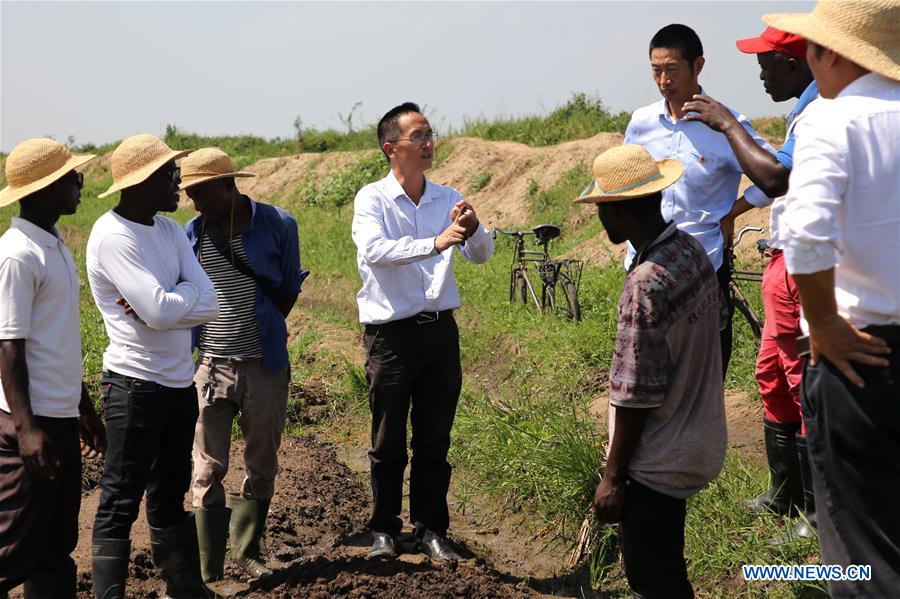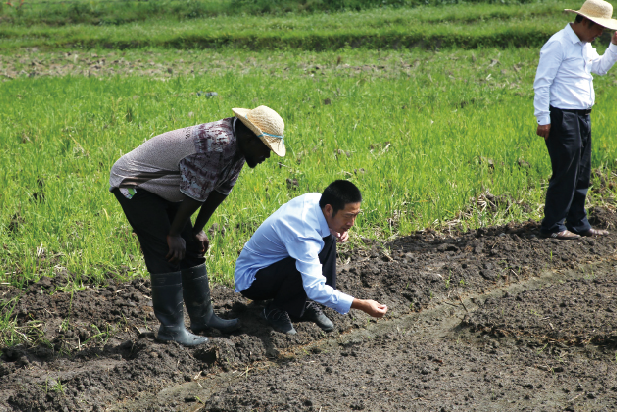
By Mbazumutima
“The Forum could rely on‘Belt and Road Initiative’ which offers an ideal framework for multilateralism, framework for the creation of various wealth, and interconnectivity infrastructures on the African Continent,” said H.E.Martin Mbazumutima, the ambassador of Burundi to China. “In the prospects, certainly we should expect China-Africa cooperation in the areas of health, digital, green development, energy, infrastructures connectivity and security, for the construction of an even stronger and more focused China-Africa community, towards a shared future.”
H.E. Martin Mbazumutima, the ambassador of Burundi to China, received an interview with China Investment magazine on February 1st, 2021. In speaking of the prospects of future cooperation between Burundi and China, His Excellency stated, “Our deepest hope is that, the cooperation between the People’s Republic of China and the Republic of Burundi continues to be excellent and be strengthened through the two existing platforms such as FSAC and BELT AND ROAD. We also hope that China will be more involved in the implementation of Burundi’s National Economic Development Plan 2018-2027.”
China Investment: In 2021, China Africa cooperation enters its 21st year, and the Forum on China-Africa Cooperation will be held in Africa. What do you think is the significance of this meeting? What problems need to be solved? What goals have been achieved? In which areas will China and Africa cooperate?
H.E. Martin Mbazumutima: Undoubtedly, Sino-African Cooperation is a platform which offers a strategic and deepening exchange framework, of bilateral and multilateral Sino African cooperation.
In this way, It’s holding in Dakar in 2021, remains a decisive turning point, especially in terms of reviving African post pandemic economy, a pandemic, that has shaken both African economies, and beyond the world economy. In Dakar, major decisions, if not orientations, are certainly expected. After the Beijing Summit in 2018, that of Dakar remains crucial, in terms of recovery of economy for Africa.
In short, we can say, that the challenges remain colossal and numerous for the African countries, which need an economic and rapid recovery, if we take into account for example the debts that many African countries are facing , insufficient health , energy, technology, and transport infrastructures and so on.
Beyond that, the Chinese experience in the field of development and the fight against poverty, can greatly inspire the Dakar Ministerial Conference, and above all, the Forum could rely on the” XI Jinping’s “Belt and Road Initiative” which offers an ideal framework for multilateralism, framework for the creation of various wealth, and interconnectivity infrastructures on the African Continent, and beyond the World.
China Africa cooperation enters its 21st year, it is the ideal and the very moment, to take balance sheet of Sino-African cooperation, over the 20 years of creation of the Forum on Sino-African Cooperation.
And so, the year 2020 marked the 20th anniversary of the Forum on Sino African Cooperation. Twenty years ago, at the dawn of the new century, China and Africa united by fraternal friendship, established the Forum on Sino-African Cooperation, following the trend of peace and development, by raising the flag of mutually beneficial cooperation high. Since then, the great China-Africa family has had its plate-form for collective dialogue and its own mechanism of pragmatic cooperation, and Sino- African relations have entered a new phase of development.
The past twenty years have been marked by common commitments and concrete results under the guidance of FSAC. And Sino-African relations have risen to the level of a new type of partnership initially, then to that, to a strategic partnership of new type in a second step, before being brought today, to the level of global strategic cooperation partnership in a third step.
In 2019 the balance sheet of Chinese direct investment in Africa amounted to 49,1billion US dollars, it is 100 times higher than that of 2000, and the volume of Sino-African trade amounted to 208,7 billion US dollars, it is 20 times higher than that of 2000 to name but a few. In short over the past two decades China has built the African Union Center in Addis Ababa, over 6000km of railroads, 6000km of roads, from all around 20 ports, and over 80 hydropower plants under Belt and Road Initiative, ten cooperative projects and eight initiatives proposed by China, in brief over the two decades bilateral trade with China has enabled Africa to take an upward trajectory towards prosperity.
Of course in the prospects, certainly we should expect China Africa cooperation in the areas of health, digital, green development, energy, infrastructures connectivity and security, for the construction of an even stronger and more focused China Africa community, towards a shared future.
China Investment: In January 2021, the African Continental Free Trade Area was officially implemented. What effect will play on the development of the African Continent? What does the African continental Free trade Area means for promoting China Africa cooperation? What is the promotion of Burundi’s development?
H.E. Martin Mbazumutima: One of the obstacles to African’s economic development has long been the low rate of intra African trade which currently represents 16 to 18% of African’s total trade, a percentage much lower than that of Europe or Asia.
So, the African Continental Free Trade Area is to promote intra African trade, by improving market, accessibility to gradual elimination of custom duties, the elimination of trade barriers, the harmonization of custom laws and practices, and the strengthening of cooperation and capacities.
Here, the African Union aims for a progressive liberalization, which in long term will pave the way for custom union and regional integration, promoting the free movement of persons and capitals, furthermore, the African Continental Free Trade Area, should cement the type of unity, which is a sine qua non prerequisite for Agenda 2063 to be full complemented.
Let us remember that the African Continental Free Trade Area has the potential to increase trade by some 52 per cent by 2022, according to the United Nations Economic Commission for Africa.
It is true, with African Continental Free Trade Area; the removal of trade barriers is an important step, for the transformation and development of Africa, which offers both Africa and China, a golden opportunity to exploit their economic potential, which will breathe new life into Sino African cooperation, and will allow their relations to reach new horizons.
In this context, before Burundi which is known as a landlocked country faces with the hassle of tariff barriers, and complex customs formalities, but with AFCTA, Burundi will constitute an important crossroads for trade and could be an important node for Africa for the connectivity in Africa of rail, road, and air infrastructures and even communication, which will at that time being, be in our opinion, engines of growth and economic development in Burundi particularly and Africa in general.

On March 12, 2019, experts from Chinese agricultural expert team to Burundi inspect a demonstration field of Chinese hybrid rice in Ninga Village, Bubanza Province in Northwest Burundi. (Xinhua/Lv Tianran)
China Investment: What are the challenges facing Burundi’s economic Development? What measures does the government have to deal with the challenge? Development plan? The key areas that the government encourages development?
H.E. Martin Mbazumutima: In the complex world and the struggle for the sustainable development, Burundi constantly faces the issue and challenges, of identifying the priorities of its people and defining the trajectory of its growth, in order to best reconcile the improvement of agriculture production, the modernization of basic infrastructure, the creation of jobs for young people, and the preservation of ecosystems.
It is in this context, that the Government has adopted a new strategic planning instrument, to lead Burundi towards emergence by 2027; it is the ten years National Development Plan of Burundi (PND 2018-2027).
The long term objective of this plan, aims to restore the structural balances of the Burundian economy, through the strengthening of food self sufficiency, and the diversification of exports through the promotion of agro industrial commercial and extractive companies , development of the energy and art sector , the construction and maintenance of infrastructure to support growth, the improvement of access to basic social services such as education, health and social protection , continuation of environmental protection programs and land use planning, improvement of financial governance and decentralization , development of regional and international partnership.
China Investment: How is the cooperation between Burundi and China progressing? In which key areas have the cooperation has the cooperation archived good results? Where do you hope to continue further in depth cooperation?
H.E. Martin Mbazumutima: Burundi and the People’s Republic of China established their diplomatic relations in 1963 December 21st and Burundi was in this way the 12th country of Africa to establish such diplomatic relations with China.
Since then, diplomatic relations between the Republic of Burundi and the People’s Republic of China have continued to strengthen and reached new levels at the bilateral as well as at the multilateral level, in various fields such as economic, education, commerce, ICT and social.
Without being exhaustive, the field of cooperation is vast from diplomacy to education including economic exchanges, infrastructures, and information and communication techniques. Burundi has also cooperation with China in agriculture and in health fields.
China Investment: What are the effects of the Belt and Road Initiative on the development of Africa? What changes has brought to the development of Burundi?
H.E. Martin Mbazumutima: On the Belt and road Initiative, His Excellency Xi Jinping spoke of Africa to benefit from the project as insufficient infrastructure is the main obstacle to development of Africa, and participation in the project, will highlight potential spin-offs such as increased investment in industry, agriculture industries, tourism, in parallel with infrastructure projects, and also will promote trade competitive at the continental level.
Of course, for Burundi what is essential is that Burundi and China, further align their development ideas and strengthen practical cooperation in a mutually beneficial spirit and within the framework of the Belt and Road Initiative and the eight major measures initiatives announced at the Forum on Sino African Cooperation, particularly in the fields of energy infrastructure agriculture tourism and digital and ICT, otherwise Burundi is willing to accelerate the joint construction of the Belt and Road and welcomes Chinese companies and investors, who are ready to invest in Burundi for mutually beneficial cooperation.
China Investment: What do you think of China Africa cooperation and the future of Burundi China cooperation?
H.E. Martin Mbazumutima: In the current time, China and Africa should coordinate cooperative efforts to take advantage of the spillover effects of the digital economy of the 21st century, which will be the century of scientific and technological innovation, which should be growth engines for a great leap forward in the economic development of the African continent, and our hope is that the FSAC which will be held in Dakar this year attaches importance to it.
Also, our deepest hope is that, the cooperation between the People’s Republic of China and the Republic of Burundi continues to be excellent and be strengthened through the two existing platforms such as FSAC and BELT AND ROAD. We also hope that China will be more involved in the implementation of Burundi’s National Economic Development Plan 2018-2027, which is in accordance with the sustainable development goals of the United Nations to be reached in 2030, the African Union 2063 Agenda, and takes into account the country’s resources.
The author, H.E. Martin Mbazumutima, is the ambassador of Burundi to China.
 Africa -China Review Africa -China Cooperation and Transformation
Africa -China Review Africa -China Cooperation and Transformation
